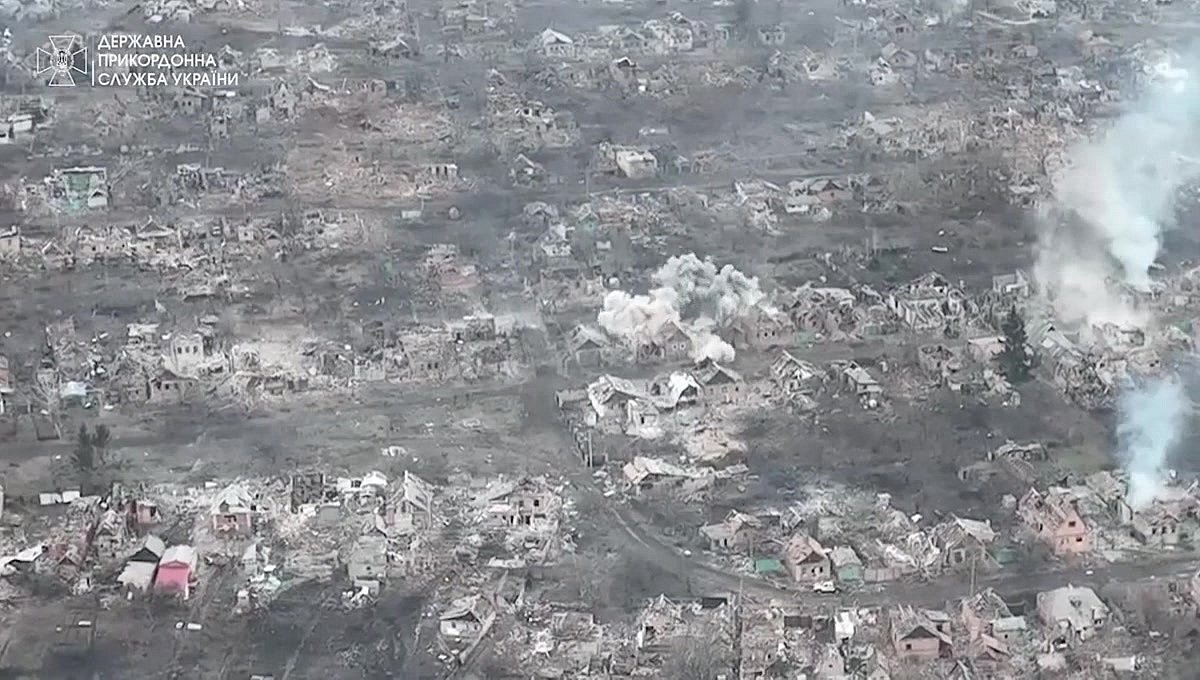Battle In Ukraine’s Bakhmut Could Decide Rest Of The War
Private sector of Bakhmut (Donetsk region of Ukraine) during the battle of the city. State Border Guard Service of Ukraine fires on fighters of Wagner Group. (Wikimedia Commons)
As of March 19, the Ukrainians remain in a bitter fight to hold the city of Bakhmut, continuing to clash against Russian forces led by the private militia known as the Wagner Group. Both armed forces have reported heavy casualties in what is now the longest and bloodiest battle since the start of the Russian invasion.
The city of Bakhmut, which has been a hotspot of fighting for months, is controlled on the eastern side by Russian forces. The western portion is under the defense of the Ukrainian military. However, Russian forces have so far been unable to surround the city, which still has 4,000 inhabitants.
In one of his nightly video addresses, Ukrainian president Volodymyr Zelenskyy said that his forces have been able to eliminate more than a thousand Russian troops during the week beginning March 6, near the front line in Bakhmut, according to reporting in Al Jazeera. On the other hand, Russia’s defense ministry stated that 200 Ukrainian soldiers have been killed within a 24-hour period on March 13.
BBC News reports that neither side has released an official casualty figure..
White House National Security spokesman John Kirby told reporters on March 15 that “the Ukrainians are taking casualties. I do not mean to underestimate that. But they are not taking casualties on the size and scale that the Russians are.”
Military experts argue that the city of Bakhmut does not possess much strategic value. Most of the population has abandoned the city, and many of the buildings have been destroyed.
Despite this fact, Russia has expended vast numbers of resources into taking the city, with 20,000 to 30,000 troops being injured or killed thus far in the battle, according to estimates by Western officials reported in the New York Times.
Yevgeny Prigozhin, the founder of the Wagner Group mercenary force, said on March 12 that “the situation there is difficult, very difficult, the enemy is fighting for every meter.”
According to Serhii Kuzan, chairman of the Ukrainian Security and Co-operation Centre, Russia is desperate for a victory to boost morale domestically. “Russians will continue to sacrifice thousands of lives to achieve their political goals,” Kuzan told the BBC. The capture of Bakhmut, would represent Russia’s first major victory in almost a year.
Ukraine is also determined to defend the ruined city of Bakhmut. “There is no part of Ukraine about which one can say that it can be abandoned,” declared President Zelensky in March. The city has become an important political symbol for both Ukrainian and Russian war efforts, similar to Mariupol earlier in the war.
Defending Bakhmut could yield some tactical benefit, according to Camille Grand, who works as a defense expert at the European Council on Foreign Relations. By having Russia spend resources and impeding the advance of its troops, Ukraine could prevent Russian forces from heading farther west.
However, the Ukrainian defense forces are firing thousands of artillery rounds each day, according to the Pentagon, fighting at a rate which Western officials perceive as unsustainable. Although the U.S. and the U.K. have been preparing to send NATO and Soviet-style ammunition, experts have warned that Ukrainian ammunition is running low, potentially risking their chances at a successful counteroffensive later.
As it stands, it is very difficult to separate political symbolism from military strategy, and often they are not mutually exclusive. Preserving politically important positions, despite the apparent absence of strategic value, may be strategically valuable in itself in regards to maintaining morale and facilitating negotiations with allies.
On March 23, Zelenskyy visited Bakhmut and spoke with soldiers coming from the front lines, demonstrating yet again the political value of the position, despite the fact that the city is practically uninhabited.
The battle for Bakhmut represents a gamble that could pay off for the Ukrainians by draining Russian resources, but could reduce Ukraine’s ability to retake other parts of its territory.

